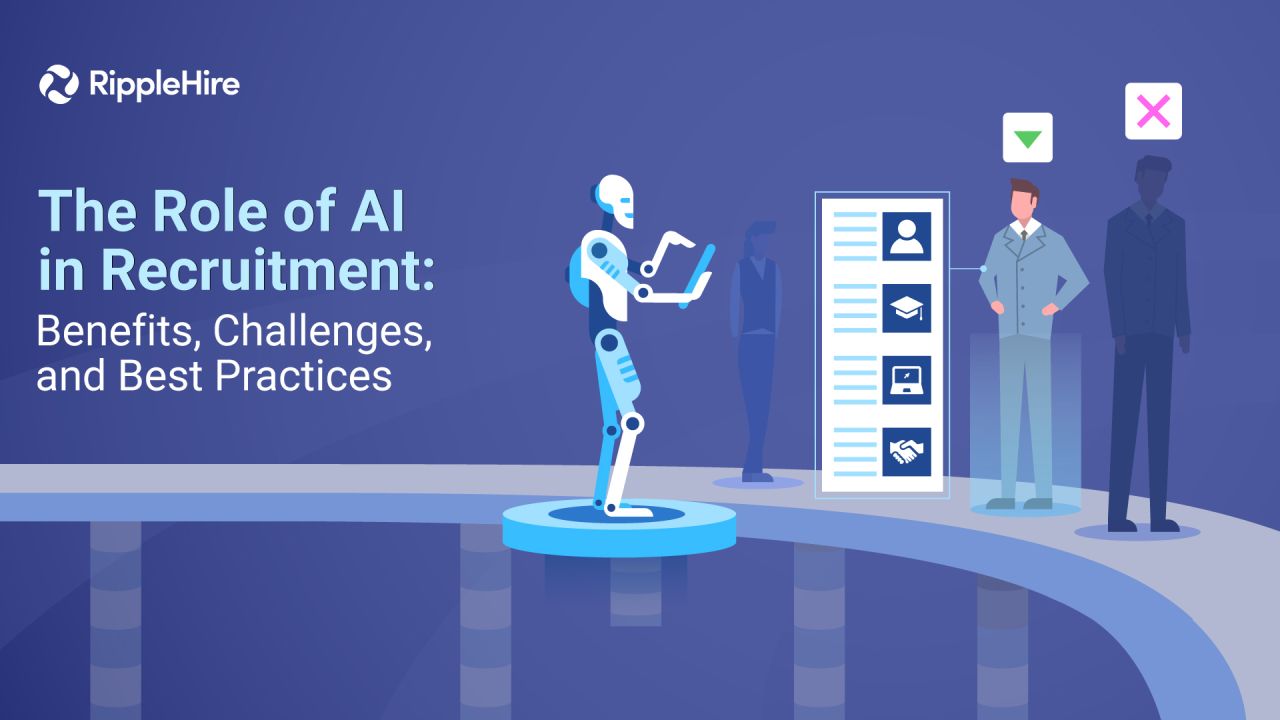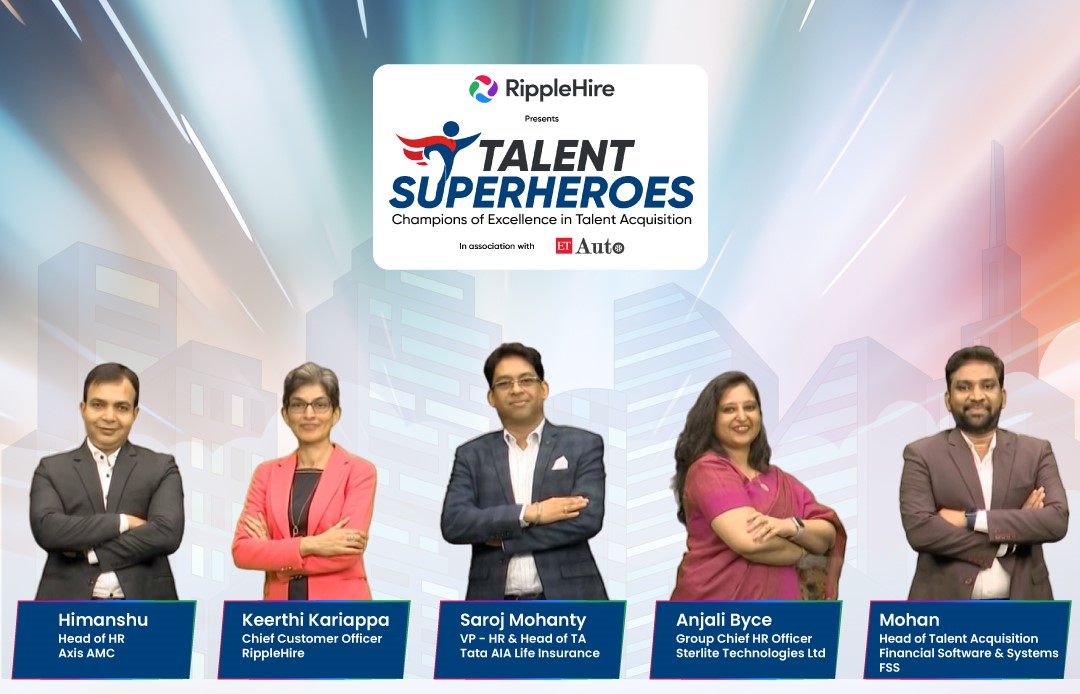Artificial intelligence is gaining more eyeballs with new developments every year. And reasonably so, since it’s transforming many businesses for good. And the same goes for the recruitment industry too.
84% of recruitment leaders believe that AI will upgrade the hiring game and can help them stay ahead of the competition.
But to make the most of it, you need to have a complete picture of what AI is capable of.
In this article, we will look at the benefits, challenges, and best practices for introducing AI to your recruitment process.
What is Artificial Intelligence?
Usually, when people hear AI, they imagine a futuristic robot that will dominate the human race at any moment. Though it’s a good plot for any movie, the reality is far from it.
AI is the simulation of human intelligence in machines designed to think and act like humans.
These systems are developed to perform tasks that typically require human intelligence, such as speech recognition, decision-making, problem-solving, and language translation. AI aims to create algorithms and systems that can perform these tasks as accurately and effectively as a human would and, in some cases, even better.
What are the Benefits of Using AI For Recruitment?
Artificial Intelligence (AI) has the potential to revolutionize the recruitment process by offering numerous benefits to companies and hiring professionals. Here are some of the advantages of introducing AI in recruitment.
1) Increased Efficiency: AI-powered recruitment tools can automate repetitive tasks, such as resume screening, scheduling interviews, and sending follow-up emails, which can help recruiters save time and be more productive.
2) Improved Candidate Experience: Positive candidate experience is critical to attracting the best talent for the job. AI can provide a more personalized and efficient experience for job candidates by automatically scheduling interviews and providing instant feedback.
3) Enhanced Objectivity: AI algorithms can help reduce unconscious bias in the recruitment process by removing subjective elements, such as a candidate’s name, age, and gender, from the selection process. It will also boost inclusivity in your team, leading to more diversity.
4) Increased Accuracy: AI algorithms can analyze large amounts of data to identify the most suitable candidates for a job based on their skills, experience, and qualifications. This can help companies make more informed hiring decisions and reduce the risk of a bad hire.
5) Cost Reduction: By automating repetitive tasks, AI can help you cut down significant expenses, resulting in the cost-effective recruitment of candidates.
Though AI has the potential to transform your recruitment process, it does come with a particular set of challenges. That’s why it’s important to note that you should use AI to augment, not replace, human decision-making in the recruitment process.
What are the Challenges of Using AI For Recruitment?
AI has some solid pros, but it also presents several challenges you must address before implementing them in your hiring process.
1) System Training: AI algorithms are only as good as the data they are trained on, and if the training data contains errors or biases, the AI system may make wrong decisions. You must train AI algorithms on a diverse dataset for accurate and unbiased hiring. Otherwise, it can limit your candidate pool with unnecessary exclusions.
2) Lack of Transparency: It can be challenging to understand how AI algorithms make decisions, reducing the recruitment team’s visibility as to why a particular candidate was rejected or selected.
3) Resistance to Change: Change in any process forces the team to change their old ways and learn more. Some hiring managers may resist such time investment and may not trust AI algorithms to make critical hiring decisions.
4) Legal and Ethical Considerations: The use of AI in the recruitment process raises essential legal and ethical questions, such as privacy and discrimination. Companies must ensure that they use AI responsibly and ethically and that it complies with all relevant laws and regulations.
5) Technical Challenges: Developing and implementing AI systems can be technically challenging. And for a fully automated recruitment process, you will require specialized skills and resources.
What are the Best Practices For Using AI in Recruitment?
You can follow these best practices to effectively manage the challenges of using artificial intelligence in recruitment.
1) Ensure Data Diversity: It’s essential to train AI algorithms on a diverse dataset, ensuring no suitable candidate is excluded from the pool. This can help ensure that the AI system makes fair and unbiased hiring decisions.
2) Provide Transparency: Your hiring managers should know how AI algorithms make decisions and provide candidates with clear explanations for why they were rejected or selected.
3) Regular Evaluation of AI Systems: To ensure accuracy and prevent errors, you should monitor and evaluate AI systems for red flags. Introduce updates as necessary to improve their performance.
4) Foster a Culture of Acceptance: To ensure that your hiring managers are comfortable using AI, you must provide them with ample training and support. It will encourage a culture of acceptance and trust in technology.
5) Comply with Relevant Laws and Regulations: Before implementing AI in your hiring process, you should ensure that the use of AI complies with all relevant laws and regulations, such as data privacy, and is ethical and responsible.
6) Partner with experts: To overcome technical challenges and ensure the effective implementation of AI systems, you can partner with experts like AI developers or consultants.
What’s the Future of Hiring With AI?
By 2030, over 6 million enterprises will utilize AI recruiting software globally. That means more competition for the top talent. How are you planning to stay ahead?
Introducing AI in your recruitment process can give you a significant edge over others only if used strategically.
Look for a solution whose algorithm accurately and consistently predicts the likelihood of a candidate’s success in a role. See how seamlessly it can integrate with your existing systems, like applicant tracking systems and background check services.
Customizability is another crucial aspect that you shouldn’t overlook. The solution should be customizable to meet your specific requirements so that you can adjust the algorithms or train it on new data.
The purpose is not to replace human intelligence with AI but to support it. So, empower your recruitment team with a user-friendly solution with intuitive workflows while being light on your pocket. If your team isn’t threatened by it, then only you can utilize AI for a sustainable hiring process.






